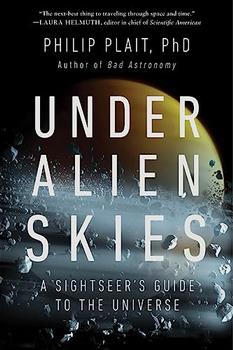Summary | Excerpt | Reviews | Beyond the Book | Readalikes | Genres & Themes | Author Bio

A Sightseer's Guide to the Universe
by Philip Plait
After a few minutes you're standing with the rest of your tour group, everyone smiling, awe lingering on their faces in a look you know your own expression must reflect. You make your way to the airlock with them, and the guides give everyone a once-over, checking suit functions and giving an electrostatic zap to remove the regolith dust. You can see the miners are already in, heading over to the shuttles that will take them back to the lunar south pole, back to the shadows, the ice, and the digging machines.
As you watch them, you have a sudden thought: You can now claim to be one of the very few human beings ever to watch a solar eclipse from the other side, to be above the Earth looking down on it as the Moon's shadow blocks the Sun to the flatlanders.
The airlock closes behind you, shutting off the lunar landscape. Time for the next adventure.
Out of the entire observable universe—countless stars, galaxies, gas clouds, and more—the Moon is the closest astronomical object to us. It's so familiar that we don't even really name it; we call it simply the moon, or, more properly, the Moon, capital M, the archetype of the other, lowercase-m moons in the solar system.
And yet, despite its being our next-door neighbor, it remains one of the more alien bodies to us there is.
It's a delightful irony. After all, the Moon is visible to our entire planet. The second brightest object in the sky, it's bright enough to read by, and it's one of the very few heavenly denizens whose features you can make out with the eye alone. It was mapped even before the telescope was invented.
But consider this: literally half the Moon is forever hidden from Earth's view. The phrase "the far side of the Moon" has even become synonymous with "mysterious," "distant," "forever hidden."
There's only so much detail we can see from Earth using large telescopes—even with the Hubble Space Telescope, the smallest object we can see on the Moon is about the size of a football field. But with the advent of space travel, our view of the Moon became orders of magnitude sharper. We've sent dozens of probes to the Moon, circling it, landing on it, roving over it. And, of course, six of those missions carried humans to walk on it.
Our last crewed lunar visit was a while ago now, but advances in rocketry have brought us achingly close to sending humans there once again. It's no longer science fiction to think that traveling to the Moon will become more routine. Rocket launches are getting less expensive, at least relative to what governments have been accustomed to spending, and more countries are getting involved with lunar exploration, looking into the possibility of crewed scientific bases and even mining the Moon for resources. So it's not at all silly to predict the rise of tourism, too. I'm not so foolish as to venture a guess as to when, specifically, but I can hope to see such a thing in my lifetime. Our Moon, paradoxically familiar yet literally unearthly, may one day have tourists cavorting around on it. What will that be like? What will these space tourists feel? What will they see?
Let's say you are just such a tourist, participating in an adventure so few have enjoyed. It's some years in the future, perhaps decades, and you rode a rocket to Earth orbit, then transferred to a Moon shuttle to take you the rest of the way to your destination. Disappointingly, perhaps, upon landing on the Moon you aren't allowed to be out in the open, but instead are taken to a landing pad, then into a tunnel that leads directly to your hotel. Safety first! You're on an inhospitable world, after all, and you need to get your Moon legs.
You'll wish you had them when you disembarked. The very first thing you'll find is that being on the Moon is decidedly weird.
I'm not talking about walking, shuffling, jumping, or comically falling down in slow motion. Certainly, the moment you try to move, you'll find yourself doing exactly that: falling, slowly, on your derriere, wildly and comically flapping your arms to no avail. But even before that, just standing there will be truly peculiar.
Excerpted from Under Alien Skies: A Sightseer's Guide to the Universe by Phillip Plait. Copyright © 2023 by Phillip Plait. Used with permission of the publisher, W. W. Norton & Company, Inc. All rights reserved.
No pleasure is worth giving up for the sake of two more years in a geriatric home.
Click Here to find out who said this, as well as discovering other famous literary quotes!
Your guide toexceptional books
BookBrowse seeks out and recommends the best in contemporary fiction and nonfiction—books that not only engage and entertain but also deepen our understanding of ourselves and the world around us.